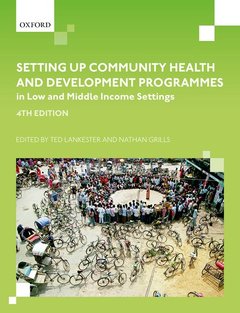Description
Setting up Community Health and Development Programmes in Low and Middle Income Settings (4th Ed.)
Coordinators: Lankester Ted, Grills Nathan J.
Language: English
Subject for Setting up Community Health and Development Programmes...:
Publication date: 03-2019
544 p. · 19.1x24.8 cm · Paperback
544 p. · 19.1x24.8 cm · Paperback
Description
/li>Biography
/li>
A majority of people living in rural areas and urban slums worldwide have minimal access to healthcare. Without information about what to give a child with stomach flu, how to relieve the pain of a broken bone, and how to work against increased substance abuse in a village, the whole community suffers. Children, adolescents, adults, and older people are all affected by the lack of what many of us view as basic healthcare, such as vaccination, pain killers, and contraceptives. To improve living conditions and life expectancy, the people in urban slums and rural areas need access to a trained health care worker, and a functioning clinic. Setting up Community Health and Development Programmes in Low and Middle Income Settings illustrates how to start, develop, and maintain a health care programme in poor areas across the world. The focus is on the community, and how people can work together to improve health through sanitation, storage of food, fresh water, and more. Currently, there is a lack of 17 million trained health care workers worldwide. Bridging the gap between medical professionals and people in low income areas, the aim of this book is for a member of the community to receive training and become the health care worker in their village. They will then in turn spread information and set up groups working to improve health. The book also explains in detail how communities can work alongside experts to ensure that practices and processes work effectively to bring the greatest impact. Copiously illustrated and written in easy-to-read English, this practical guide is designed to be extremely user friendly. Ideal for academics, students, programme managers, and health care practitioners in low and middle income settings worldwide, it is an evidence based source full of examples from the field. Setting up Community Health and Development Programmes in Low and Middle Income Settings shows how a community can both identify and solve its own problems, and in that way own its future. This is an open access title available under the terms of a CC BY-NC 4.0 International licence.
Dr Ted Lankester is Founder and Co-Leader of the global health network Arukah Network (previously known as Community Health Global Network), and President and senior clinician with the international humanitarian support organisation Thrive Worldwide. He has written several books on travel health, as well as chapters on the health of expatriates and humanitarian workers. He has also pioneered new models of health care in the North Indian Himalayas (co-funded by DfiD (ODA) where he was involved in setting up a number of community health programmes in remote areas. Associate Professor Grills is a Public Health Physician with the Nossal Institute for Global health, University of Melbourne. Dr Grills works on non-communicable diseases, community health and disability largely in the Indian context. He researchers disability measurement and tobacco control policy with the Public Health Foundation of India and the CHGN Uttarakhand Cluster. He has worked in international health in Africa, Fiji, East Timor, PNG, Bangladesh and Nepal.
© 2024 LAVOISIER S.A.S.




